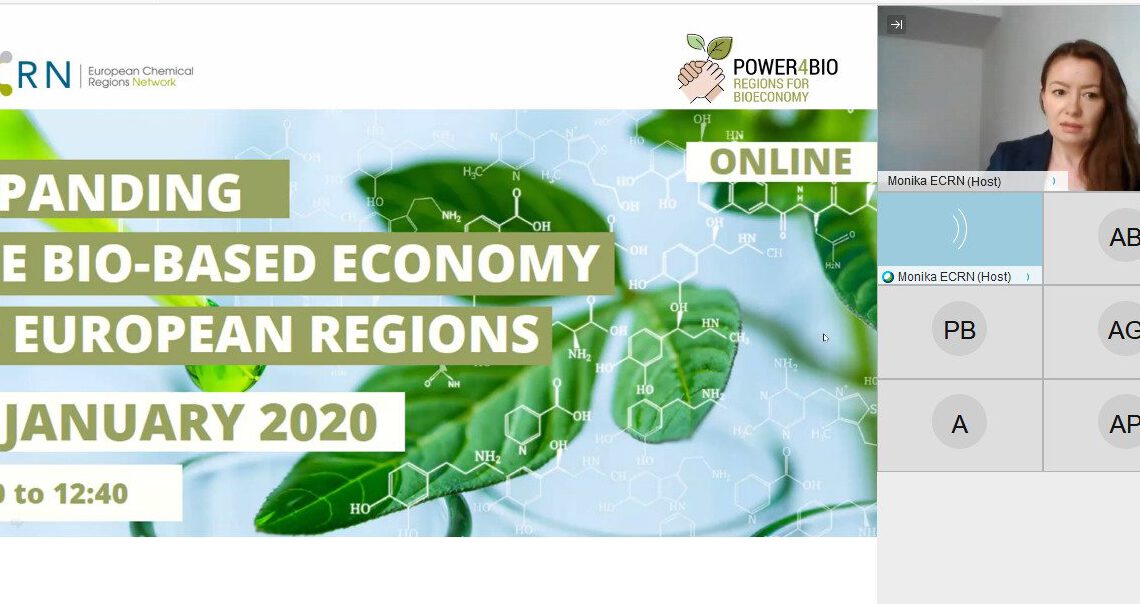21 January 2021 – In the framework of the POWER4BIO online cross-visit to Mazovia, the European Chemical Regions Network (ECRN) organized the workshop “Expanding the bio-based economy in European regions”. By showing regional initiatives and bio-based solutions, the workshop proved how cooperation among regions and public-private partnerships can effectively support the creation of innovative cross-border bio-based value chains.
The development of a sustainable bioeconomy has enormous potentials to increase the competitiveness, sustainability, and modernization of the European economy. With the rapid growth of the global population, the demand for raw materials is increasing exponentially with a high risk of natural resource depletion. Bio-based solutions have enormous potentials to replace fossil fuels, reduce energy demand, pollution and waste while increasing the reuse and recyclability of materials and products.
Monika Banka, Network Coordinator of ECRN, provided an overview of the ECRN network and its policies priorities for shaping a sustainable bio-based sector in Europe. As many bioeconomy-enabling products and solutions are based on chemicals, the role of the chemical industry is key to ensure the success of the European bioeconomy. Ms. Banka presented six examples of bioeconomy strategies of ECRN member regions, showing how cooperation between governments, academia, and the private sector can accelerate the creation of innovative and sustainable bio-based ecosystems bringing sustainable economic development in European regions.
Mr. André Heeres, Professor of biobased & circular chemistry at the Hanze University of Applied Sciences, explained Groningen Province’s pathway towards climate neutrality and how the chemical cluster in Emmen wants to become a frontrunner for the circular and bio-based economy in Europe. Northern Netherlands is an agricultural region and in the transition to the bio-based economy sees an opportunity to foster economic growth and resilience. Northern Netherlands's ambition is to couple agriculture with the chemical sector to create circular bio-based ecosystems, by using wind and solar powers to provide renewable energy and hydrogen and biomass as feedstock for the chemical industry to produce bio-chemicals and bio-plastics. In order to make this transition a reality, the regional government, research institutes, and companies are working together in public-private partnerships that really make the difference to stimulate innovation and develop ideas up to commercialisation.
Mr. Marijn Rijkers, Program Director Biobased of Chemelot InSciTe, Limbourg, showed how the chemical industry can become circular and bio-based and what is the process this transition will require. Chemelot InSciTe is the biggest chemical cluster in the Netherlands and it was created by a public-private partnership among regional stakeholders aiming to provide shared infrastructure, pilot plans, materials, and resources to accelerate knowledge and innovation for green chemistry. By using biomass to reduce the industry footprint, creating value with different feedstock, and maintaining the value by recycling, the cluster is investing in the development of biobased circular solutions. However, to make bio-based solutions competitive in the market, we will need a level playing field, also in terms of price, with products produced from raw materials and fossil fuels.
Mr. Raimo Van der Linden, Biotech Campus Delft, South Holland, presented the Bioprocess Pilot Facility (BPF) a shared pilot facility for bio-based processes, located in Delft, and providing access to piloting equipment and technical support to companies willing to test their ideas while keeping their IPs. For many small-scale companies the piloting phase is not affordable and testing the product only becomes possible through subsidies. While presenting the recommendations from the Interreg project “SMART Pilots”, Mr. Van der Linden, underlined how the use of voucher schemes giving access to pilot facilities to small SMEs and start-ups can stimulate and boost innovation locally.
All the speakers showed us that making the EU chemical industry circular, bio-based, and climate-neutral is technically possible and we already have the knowledge and resources to do so. However, innovation cannot happen without access to finance and resources. Interinstitutional and interregional cooperation are essential elements for the creation of bio-based circular ecosystems. By sharing facilities and knowledge and by designing the right policies and funding schemes to stimulate innovation, public-private-partnerships can make a difference to accelerate sustainable economic development.



